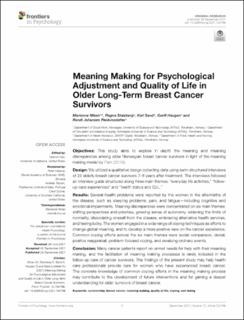| dc.contributor.author | Nilsen, Marianne | |
| dc.contributor.author | Stalsberg, Ragna | |
| dc.contributor.author | Sand, Kari | |
| dc.contributor.author | Haugan, Gørill | |
| dc.contributor.author | Reidunsdatter, Randi Johansen | |
| dc.date.accessioned | 2022-05-06T08:55:23Z | |
| dc.date.available | 2022-05-06T08:55:23Z | |
| dc.date.created | 2021-09-02T20:22:52Z | |
| dc.date.issued | 2021 | |
| dc.identifier.citation | Frontiers in Psychology, 12, 734198. | en_US |
| dc.identifier.issn | 1664-1078 | |
| dc.identifier.uri | https://hdl.handle.net/11250/2994505 | |
| dc.description.abstract | Objectives: This study aims to explore in depth the meaning and meaning discrepancies among older Norwegian breast cancer survivors in light of the meaning making model by Park (2013).
Design: We utilized a qualitative design collecting data using semi-structured interviews of 23 elderly breast cancer survivors 7–8 years after treatment. The interviews followed an interview guide structured along three main themes: “everyday life activities,” “follow-up-care experiences” and “health status and QoL.”
Results: Several health problems were reported by the women in the aftermaths of the disease, such as sleeping problems, pain, and fatigue—including cognitive and emotional impairments. Meaning discrepancies were concentrated on six main themes: shifting perspectives and priorities, growing sense of autonomy, widening the limits of normality, dissociating oneself from the disease, embracing alternative health services, and feeling lucky. The women engaged in a wide range of coping techniques as efforts to change global meaning, and to develop a more positive view on the cancer experience. Common coping efforts across the six main themes were social comparison, denial, positive reappraisal, problem-focused coping, and revaluing ordinary events.
Conclusion: Many cancer patients report on unmet needs for help with their meaning making, and the facilitation of meaning making processes is rarely included in the follow-up care of cancer survivors. The findings of the present study may help health care professionals provide care for women who have experienced breast cancer. The concrete knowledge of common coping efforts in the meaning making process may contribute to the development of future interventions and for gaining a deeper understanding for older survivors of breast cancer. | en_US |
| dc.language.iso | eng | en_US |
| dc.publisher | Frontiers | en_US |
| dc.rights | Navngivelse 4.0 Internasjonal | * |
| dc.rights.uri | http://creativecommons.org/licenses/by/4.0/deed.no | * |
| dc.subject | Survivorship | en_US |
| dc.subject | Breast cancer | en_US |
| dc.subject | Meaning making | en_US |
| dc.subject | Quality of life | en_US |
| dc.subject | Coping | en_US |
| dc.subject | Well-being | en_US |
| dc.title | Meaning making for psychological adjustment and quality of life in older long-term breast cancer survivors | en_US |
| dc.type | Peer reviewed | en_US |
| dc.type | Journal article | en_US |
| dc.description.version | publishedVersion | en_US |
| dc.rights.holder | © 2021 Nilsen, Stalsberg, Sand, Haugan and Reidunsdatter. This is an open-access article distributed under the terms of the Creative Commons Attribution License (CC BY). The use, distribution or reproduction in other forums is permitted, provided the original author(s) and the copyright owner(s) are credited and that the original publication in this journal is cited, in accordance with accepted academic practice. No use, distribution or reproduction is permitted which does not comply with these terms. | en_US |
| dc.source.volume | 12 | en_US |
| dc.source.journal | Frontiers in Psychology | en_US |
| dc.identifier.doi | 10.3389/fpsyg.2021.734198 | |
| dc.identifier.cristin | 1930992 | |
| dc.source.articlenumber | 734198 | en_US |
| cristin.ispublished | true | |
| cristin.fulltext | original | |
| cristin.qualitycode | 1 | |

